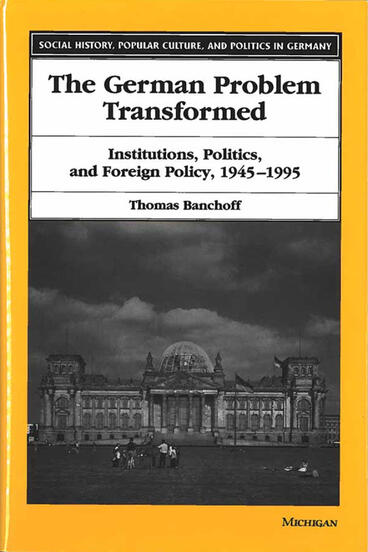The German Problem Transformed
Institutions, Politics, and Foreign Policy, 1945-1995
A systematic examination of Germany's post-reunification foreign policy from a broader historical and analytical perspective
Description
Does the new, more powerful Germany pose a threat to its neighbors? Does the new German Problem resemble the old? The German Problem Transformed addresses these questions fifty years after the founding of the Federal Republic and ten years after the fall of the Berlin Wall.
Many observers have underscored the reemergence of Germany as Europe's central power. After four decades of division, they contend, Germany is once again fully sovereign; without the strictures of bipolarity, its leaders are free to define and pursue national interests in East and West. From this perspective, the reunified Germany faces challenges not unlike those of its unified predecessor a century earlier.
The German Problem Transformed rejects this formulation. Thomas Banchoff acknowledges post-reunification challenges, but argues that postwar changes, not prewar analogies, best illuminate them. The book explains the transformation of German foreign policy through a structured analysis of four critical postwar junctures: the cold war of the 1950s, the détente of the 1960s and 1970s, the new cold war of the early 1980s, and the post-cold war 1990s. Each chapter examines the interaction of four factors--international structure and institutions, foreign policy ideas, and domestic politics--in driving the direction of German foreign policy at a key turning point.
This book will be of interest to scholars and students of German history, German politics, and European international relations, as well as policymakers and the interested public.
Thomas Banchoff is Assistant Professor of Government, Georgetown University.
Thomas Banchoff is Assistant Professor of Government, Georgetown University.
Reviews
"Provides a sweeping review of the development of the foreign policy of the Federal Republic from the 1950's through the 1990's. . . . Banchoff manages to show convincingly that structural factors such as the balance of military power or opportunities for economic cooperation alone did not determine foreign policy outcomes. . . . The range of Banchoff's analysis is impressive. The manner in which he pulls the different elements together makes for an interesting and powerful argument."
- Thomas Berger
—Thomas Berger, German Politics and Society, Spring 2001
"The book is a superb, concise overview of West German foreign policy during the cold war."
- Stephen F. Szabo, Johns Hopkins University
—Stephen F. Szabo, Johns Hopkins University, International History Review, December 2000
". . . Banchoff has produced a most valuable and interesting study that offers a sound, well-structured overview of the turning poets in the transformation of (West) German foreign policy since 1949. Not least, the book provides many stimulating ideas to pursue on German postwar history and politics."
- Klaus Larres, Queen's University of Belfast
—Klaus Larres, Queen's University of Belfast, Journal of Cold War Studies, Volume 4, No. 2 (Spring 2002)

